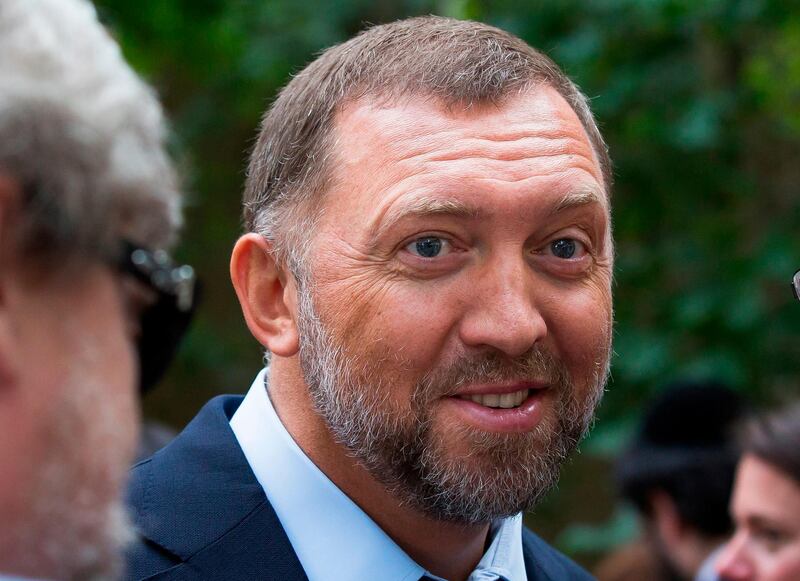The US punished 24 Russian oligarchs and government officials with further sanctions on Friday, striking Vladimir Putin's allies for "malign activity", including alleged meddling in the 2016 US election.
The sanctions also targeted a dozen Russian companies owned or controlled by the oligarchs.
Senior officials in Donald Trump's administration announced the sanctions as part of an ongoing effort by the US to push back against Mr Putin's government. Since Mr Trump took office last year, the US has sanctioned 189 Russian-related people or entities.
Rather than punishing Russia for one specific action, the new sanctions are in response to "the totality of the Russian government's ongoing and increasingly brazen pattern" of bad behaviour, said the officials, who briefed reporters on condition of anonymity.
The officials ticked through a list of activities they said had prompted the US to act, including Russia's actions in Crimea and eastern Ukraine, support for Syrian President Bashar Al Assad, cyber-hacking and attempts to subvert Western democracy.
In recent weeks Mr Trump's administration has rolled out a series of actions — including several economic and diplomatic steps — to increase pressure on Mr Putin and those in his circle.
"Nobody has been tougher on Russia than I have," the president said at a news conference on Tuesday.
President Trump has avoided criticising Mr Putin himself, however, inviting the Russian leader to meet with him, possibly at the White House.
There was no immediate reaction from Russia's government.
_______________
Read more:
[ The scale of the big freeze has caught Russia by surprise ]
[ Russia crisis set to worsen despite warnings of 'inadvertent war' ]
[ Britain must seize oligarchs’ cash, says Putin’s ‘number one enemy’ ]
_______________
Many of the targets listed are individuals and businesses associated with Russia's energy sector, including those affiliated with state-owned Gazprom. Officials said the goal was to show that those who have benefited financially from Mr Putin's position of power are fair game for US punishments, noting that many of those being sanctioned are closely tied to the Russian president.
Among the targets are:
Kirill Shamalov, who is reportedly Mr Putin's son-in-law, married to Katerina Tikhonova. Neither Mr Putin nor the Kremlin have acknowledged that she is his daughter.
Igor Rotenberg, the son of Arkady Rotenberg, a friend of Mr Putin's since they were teenagers.
Andrey Kostin, named among government officials, heads the nation's second-largest bank, VTB, which is controlled by the state.
Alexei Miller, longtime head of the state-controlled Gazprom natural gas giant. Both Mr Miller and Mr Kostin are key members of Mr Putin's team.
Other oligarchs on the list include top names on the Forbes list of billionaires who are not part of Mr Putin's inner circle but, like any other billionaire tycoons in Russia, vie for the Kremlin's attention to preserve and extend their business empires.
Also targeted is aluminium magnate Oleg Deripaska, a figure in the Russia investigation over his ties to former Trump campaign chairman Paul Manafort. Mr Deripaska has been placed under US sanctions previously, but officials said those announced Friday were more comprehensive.
Many of the Russian oligarchs, politicians and affiliated businesses were identified by the Treasury and State Department as potential targets on a list compiled and published in January.
The sanctions freeze assets in US jurisdictions and bar Americans from doing business with those named. The administration said it would offer guidance to Americans who may currently have business with them about how to avoid running afoul of the sanctions.
The Trump administration used a variety of legal mechanisms to implement the sanctions, including the Countering America's Adversaries Through Sanctions Act. The law was overwhelmingly passed by Congress in 2017 and signed by President Trump despite some objections. It aims to punish Russia for interfering in the US election or actions intended to subvert democracy in Europe. The law also authorises the president to impose sanctions on Iran for destabilising activity in the Middle East and on North Korea for its nuclear and ballistic missile programmes.
Last month, the US targeted 19 Russians and five other entities with sanctions in the first use of the law. The administration has also expelled dozens of Russian diplomats and shut down two Russian consulates in response to Russian behaviour, including the poisoning of an ex-spy in Britain that has been blamed on Moscow.






